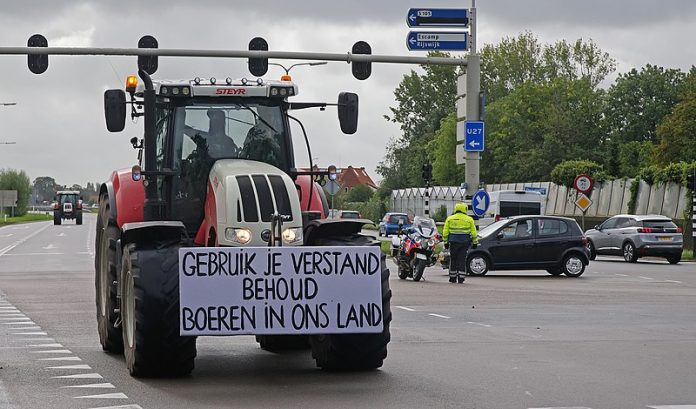By Michael Shellenberger
ALMERE, Netherlands — Farmers in the Netherlands reduced nitrogen pollution by nearly 70% through a voluntary system. But the government says that is not enough and is demanding that they cut pollution by another 50% by 2030.
By the Dutch government’s own estimates, 11,200 farms out of the roughly 35,000 dedicated to dairy and livestock would have to close under its policies; 17,600 farmers would have to reduce livestock; and total livestock would need to be reduced by one-half to one-third. The Dutch government has demanded that animal farming stop entirely in many places. Of the over $25.7 billion the government has set aside to reduce pollution, just $1 billion is for technological innovation, with most of the rest for buying out farmers.
This effort has sparked a fierce backlash among Dutch farmers, who argue that the government seems more interested in reducing animal agriculture than in finding solutions that protect the food supply and their livelihoods.
“Why would you buy out farmers or reduce livestock when you have the possibility to invest in innovation?” asked Caroline van der Plas, the founder and sole Member of Parliament for the Farmer-Citizen Movement party, or BBB in Dutch. “The car industry innovated for the past 40 years. There aren’t fewer cars and the cars we have are cleaner. We even have electrical cars. That’s what I think is so crazy. Why don’t we treat the farmers just like the car industry? Give them time to develop solutions or innovate? We can produce food in a much more efficient and cleaner way if we do that. And it’s much cheaper also then by buying out farmers.”
Farmer protests in the Netherlands come at a time of heightened global food insecurity created by Russia’s invasion of Ukraine, a major wheat exporter.
The Netherlands is the largest exporter of meat in Europe and the second largest exporter of food overall by economic value in the world, after the United States, a remarkable feat for a nation half the size of Indiana. Farm exports generate nearly $100 billion a year in revenue. Experts attribute the nation’s success to its farmers’ embrace of technological innovation.
The Netherlands is just one of the countries where governments are pushing for sharp limits on farming. Canada, for example, is seeking a 30% reduction in nitrogen pollution by 2030. While the Canadian government says it is not mandating fertilizer use reductions, only pollution reductions, experts agree that such a radical pollution decline in such a short period will only be possible through reducing fertilizer use, and thus food production. The cost to farmers would be between $10 billion and $48 billion.
“If you push farmers against the wall with no wiggle room, I don’t know where this will end up,” said Gunter Jochum, president of the Western Canadian Wheat Growers Association. “Just look at what’s happening in Europe, in the Netherlands. They’ve had enough of it.”
Where the proposed Dutch restrictions are driven by land and air pollution concerns, the Canadian restrictions are driven by the desire for strong action on climate change. But greenhouse gas emissions from farming pale compared to those from energy. Where carbon emissions from farming in Canada rose 87% to under 8 metric tons between 1990 and 2020, emissions from oil and gas production tripled, adding 69 metric tons of carbon dioxide, during the same period. With the pollution, however, came more food. Canada’s spring wheat yields increased over 40% during the period.
The most dramatic consequences of government intervention occurred in Sri Lanka, where a 2021 fertilizer ban led to a massive reduction in yields, sparking starvation and an economic crisis that brought down the government in July. Because agriculture is a source of greenhouse gases, the efforts by the governments and the backlash they are fomenting may be a harbinger of a global crisis.
To read the rest, click here.
Originally published by RealClearInvestigations. Republished with permission.
Michael D. Shellenberger is an author and former public relations professional whose writing has focused on the intersection of climate change, nuclear energy, and politics.
For more on food shortages, click here.
For more on Dutch farmer protests, click here.



























Aug 22, 2022 ‘We farmers need to stand together’: Feds take aim at Pennsylvania organic farmer
Rebel News’ Jeremy Loffredo spoke with Miller’s Organic Farm owner Amos Miller to discuss how the federal government is attempting to shut down his operations for simply exercising his religious freedom to grow and raise food in accordance with his beliefs.
https://youtu.be/_5HhcvF_RRE